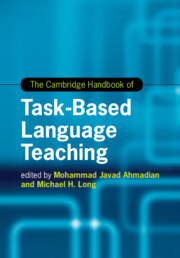Book contents
- The Cambridge Handbook of Task-Based Language Teaching
- Cambridge Handbooks In Language And Linguistics
- The Cambridge Handbook of Task-Based Language Teaching
- Copyright page
- Dedication
- Contents
- Figures
- Tables
- Contributors
- Preface The Origins and Growth of Task-Based Language Teaching
- Part I The Rationale for Task-Based Language Teaching
- Part II Tasks and Needs Analysis
- Part III The Task Syllabus and Materials
- Part IV Methodology and Pedagogy
- Part V Task-Based Language Teaching with School-Age Children
- Part VI The Teacher in Task-Based Language Teaching
- Part VII Task-Based Assessment and Program Evaluation
- Part VIII Research Needs and Future Prospects
- 15 Methodological Approaches to Investigating Task-Based Language Teaching
- 16 Task-Based Language Teaching as an Innovation
- 17 The Adoption of Task-Based Language Teaching in Diverse Contexts
- Conclusion
- Index
- References
16 - Task-Based Language Teaching as an Innovation
A Task for Teachers
from Part VIII - Research Needs and Future Prospects
Published online by Cambridge University Press: 19 November 2021
- The Cambridge Handbook of Task-Based Language Teaching
- Cambridge Handbooks In Language And Linguistics
- The Cambridge Handbook of Task-Based Language Teaching
- Copyright page
- Dedication
- Contents
- Figures
- Tables
- Contributors
- Preface The Origins and Growth of Task-Based Language Teaching
- Part I The Rationale for Task-Based Language Teaching
- Part II Tasks and Needs Analysis
- Part III The Task Syllabus and Materials
- Part IV Methodology and Pedagogy
- Part V Task-Based Language Teaching with School-Age Children
- Part VI The Teacher in Task-Based Language Teaching
- Part VII Task-Based Assessment and Program Evaluation
- Part VIII Research Needs and Future Prospects
- 15 Methodological Approaches to Investigating Task-Based Language Teaching
- 16 Task-Based Language Teaching as an Innovation
- 17 The Adoption of Task-Based Language Teaching in Diverse Contexts
- Conclusion
- Index
- References
Summary
This chapter approaches the implementation of task-based language teaching (TBLT) in the second language classroom as a task for teachers. As the available research into change management and educational innovation indicates, there are many factors that potentially impact on teachers’ willingness and competence to put TBLT principles to practice. Studies into the implementation of TBLT suggest that, amongst others, teachers need to be granted autonomy to give personal meaning to TBLT and link it to their local context. In addition, they need time, sustained and system-wide assistance (from policy-makers, coursebook developers and teacher educators), and the support of their colleagues and principals to make their use of tasks truly rewarding for themselves and for their students’ language development.
- Type
- Chapter
- Information
- The Cambridge Handbook of Task-Based Language Teaching , pp. 628 - 648Publisher: Cambridge University PressPrint publication year: 2021
References
Further Reading
References
- 5
- Cited by

